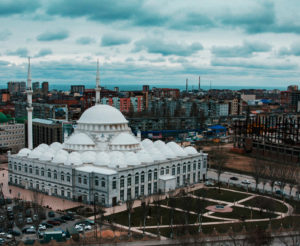

 A court in Makhachkala’s Sovetskiy District dismissed local resident Arsen Gasanov’s bid to have his name removed from the ‘preventive supervision list’ on 29 March. He plans to appeal the case at the republic’s Supreme Court.
A court in Makhachkala’s Sovetskiy District dismissed local resident Arsen Gasanov’s bid to have his name removed from the ‘preventive supervision list’ on 29 March. He plans to appeal the case at the republic’s Supreme Court.
In January, 40-year-old Hasanov approached OC Media for help after discovering that he was on the Ministry of Internal Affairs’ preventive supervision list, labelled an ‘extremist’. According to Hasanov, he appeared on the list after being detained by police on his way to attend Friday prayers. The police pushed him into a car and took him to the police station.
Hasanov appealed to the court in Makhachkala in February with a request to remove his name from the list. The case lasted more than a month.
‘I was accused of having invented everything. This trial was a farce. The defendants stated that they had no information that I was on the list,’ Hasanov told OC Media.
‘This is despite the fact that we have an official response from the head of the district police department which says that I am on it as an “extremist”. We have all these papers and we introduced them in court. The judge just sits there covering his ears. I won’t leave things like this. I will continue fighting for justice’.
In March, the Supreme Court sent a request to Daghestan’s Interior Ministry to provide the court with the ministry’s procedures for regulating the preventive supervision list. In his response on 23 March, Abdurashid Magomedov, head of the ministry, denied that any such ‘extremist’ category was supervised by them.
Hasanov will appeal to the Supreme Court within ten days.
Daghestan has been adding people to the preventive supervision list for several years. On 23 June, Russia adopted a law allowing those who are ‘prone to crime’, or whose behaviour is ‘antisocial’ or ‘violates generally accepted standards of behaviour and moral, rights, and legitimate interests of others’ to be added to the list, which imposes restrictions on freedom. Opaque procedures for adding people to the list allow law enforcement officers to include practically any Russian citizen. As a rule, people, who find themselves on the list must report their movements and actions to their local police precinct. Yet, since the law doesn’t specify how to handle people who are included in the list, in practice, each police station sets their own rules.







